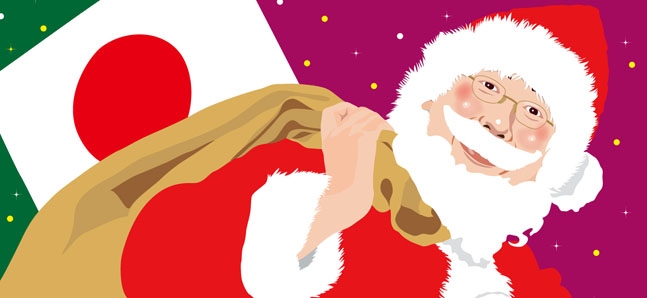The Hot Seat: Paradise Yamamoto

Illustration by Haruna Nitadori
Posted: Wed Dec 08 2010
Paradise Yamamoto, the first Santa in Asia to be accredited by Greenland’s International Association of Authorized Santa Claus, passed his official Santa exam nearly thirteen years ago, in 1998. What’s it like to live life as an official Santa Claus? And what’s the ‘proper’ way to have a merry Christmas? Time Out Tokyo spoke to the man himself, Paradise Yamamoto, to find out.
Is it correct to say that you became an official Santa Claus – accredited by Greenland’s International Association of Authorized Santa Claus – after being recommended to do so by a friend?
PY: Not so much ‘recommended’ as ‘tricked into’. [Laughs] I guess you could say it came about as a result of a ‘recommendation’, but it’s probably more accurate to say that I was led down a path not entirely of my own volition. I’ve always been unable to withstand things like top-quality all-you-can-eat yakiniku or shabu shabu, and I’m still not really sure if, from just one chance invitation of ‘Yamamoto-san, want to eat shabu shabu with an interesting friend of my’n?’, my life took a turn for the better or worse [Laughs].
What do you mean? [Laughs]
PY: At the time, there was no accredited Santa Claus in Japan or even Asia. It might seem strange, but Japan is the only country that thinks Santa lives in Finland and that, each year, it’s Finland from which he makes the journey to Japan from; however, the Santa Claus who used to come from Finland each year was a fake – who used to make a real mess of things. To the rest of the world, it’s common knowledge that Santa Claus lives in Greenland and that Finland is where the reindeer live. I don’t mean to speak badly of the Santa Claus in Finland, but that’s what led Greenland’s International Association of Authorized Santa Claus to invite me to become Japan’s official Santa Claus. To tell the truth, before I was invited, there was a different candidate auditioning for the role, and everything was pretty much decided. However, he evidently pulled out at the last minute after learning that, although financial assistance would be given for the first year, should he pass the exam, the travel expenses to each year’s summer Santa Claus conference would have to come from his own pocket. Which left everyone with the plight of then having to quickly find a replacement – which is where I came in.
Surprisingly, there’s also no financial support for purchasing a costume, instead, it’s customary to prepare a costume for oneself. I phoned around to various places in Tokyo but was repeatedly told ‘we’ve nothing of that nature in summer’ and ended up with a costume made by my wife. After that, just before I was about to set off for the exam, I received another surprise, this time by way of a fax instructing me to wear my costume throughout the entire journey, including the flight, and that, should I fall into any ‘traps’ along the way, I am to laugh ‘Ho Ho’, whilst clutching a Japanese flag in my right hand and a sack in my left hand. So there I was, in Narita, dressed as Santa Claus in July, thinking ‘this is unbelievable’ – doing exactly as instructed. Then, as I stood waving the Japanese flag around, I fell into my first ‘trap’: a large group of media. At the time, in 1998, there was nothing aired about it in Japan; however, various large news groups, like the BBC, evidently took a keen interest in the story of the first person from Japan travelling to take the official Santa Claus exam. Someone requested that I write Santa Claus on a memo, I obliged and began to write in katakana, but then somebody began blurting out ‘that’s not right!’ – which confused me; so instead, I wrote it in kanji – as something like ‘Mr. Bankrupt/pitiful’. The following morning, the scene was all over the news and queues of kids began asking for my autograph. Amazing! I remember thinking ‘Wow, who’d have thought I’d be so popular?!’, followed by ‘What the heck am I gonna do if I fail the exam!’ – which really motivated me to try and actually pass it. [Laughs]
Did you do any special studying to become Santa Claus?
PY: I had to resort to some overnight cramming, because the first time I heard that I’d be required to take an exam was in Narita – just before I was about to depart. Plus, when I spoke to the association directly, they simply told me ‘Just enjoy yourself – as if it were a vacation!’. The actual exam consisted of an interview, ‘Ho Ho Ho’ training, and a practical that involved climbing down a chimney, running to place some presents and eating a cookie before returning to base. You could consider it a bit showy, but the local children really enjoy seeing all the different Santa Claus who come to try out for the test. The children all wave the Japanese flag and shout ‘Yapan! Yapan! [Japan! Japan!]’ to show their support.
Sounds like an amazing experience.
PY: It is. Becoming an accredited Santa Claus might seem a bit strange, but it doesn’t stop there. When I joined, there were one-hundred-and-twenty accredited Santa Claus, and every one of them seemed to bear a grudge against me. Even though I’ve only a little on top, the other Santas would protest ‘You’ve still got your hair!!’ and say things like ‘What’s with that smiling face?!’. When I joined, at 35 years of age, in 1998, I was the youngest Santa Claus in the group, and even now, at the age of 48, I’m still no higher up in the hierarchy. In the thirteen years that have passed, although another six Santa Claus have been accredited, they’re all about sixty or seventy years old – meaning nothing has really changed; I’m still the youngest.
So becoming an accredited Santa Claus at the age of just 35 was quite an achievement.
PY: I expect they probably thought ‘Here comes a funny Japanese guy who’ll bend to our every whim’. Over the years, I’ve occasionally had to deal with various difficulties. Once, just as I was about to head off to Narita, to attend the annual Santa Claus conference in July, I considered simply giving up, thinking ‘if I quit now and don’t go then I’m sure my life will probably be a lot easier’, to which my wife replied ‘If it’s really that troublesome then just quit and be done with it’; but, since I’d already paid for the flight and didn’t want to let it go to waste, I ended up going anyway.
When I think of Santa Claus, I tend to imagine a somewhat saintly figure. Is it a difficult role to fulfill?
PY: I certainly wouldn’t consider myself to be a saint, but, to begin with, I didn’t really know what being a Santa Claus involved. However, during the first two or three years, I began visiting a number of children’s facilities and hospitals. Some of the children have to permanently live at hospitals and some of them have no parents or relatives. When I arrive, children get really happy and excited, and you begin to realize the importance of being Santa Claus and how best to try and fulfill the role; there are times when you want to stop but just can’t bring yourself to actually quit. Plus, just because you’re an accredited Santa Claus doesn’t entitle you to any special funding; instead, more often than not, you have to pay your own way and make sacrifices. If I were to quit, then everything I’ve done until this point would’ve all been for nothing.
Japan spreads a lot of its wealth around the world, but, even now, there are still a lot of places within Japan that don’t receive enough support, and for many places, it’s all too late in the coming. Plus, even when funds are allocated for supporting children, they aren’t always used in the best possible way. I’ve no intention of becoming a politician, but, through the role of Santa Claus, I can at least continue to bring joy to as many children as I can.
I should also add that those nasty old Santas who were mean to me before, have, over the last few years, really warmed up a great deal. When I arrive in Denmark, or Sweden, they come to greet me at the airport and even let me stay with them at their houses. At this year’s conference, the organizers commented that ‘Paradise did a great job this year and his work in Japan has been especially commendable’, after which, all the other Santas rose to their feet in unison and gave me a big round of applause. I was so happy that my eyes filled with tears. Plus, as a token of their thanks, they gave me a Georg Jensen star that currently decorates the top of our office Christmas tree. So, although it took me about ten years to get here, the last few years have been a kind of reward, if you will, for having stuck with it and not given up. I understand now, that the other Santas were all looking at me, wondering whether I was in it for the long haul or not; wondering if I’d realize that being Santa isn’t about one’s own losses or gains, and that it isn’t something that should be thought of as transient.
In addition to being an accredited Santa Claus, you’ve also appeared as a musician at Fuji Rock and you’re also known to practice the art of bonsai, right?
PY: Some people say I should stick to just playing Santa Claus. On Twitter I often write things as I see them, sometimes quite frankly – I’ve managed to lose as many as two hundred followers in a single evening before. Losing so many follows in one go isn’t something that really pleases me; however, when someone says something like ‘why on earth is someone like you doing something like that’, I feel invigorated to do more – it’s like a source of energy for me. Placing a small figurine next to a bonsai tree, for example, has resulted in some incredibly harsh criticism. I wouldn’t go as far as to say that my life has ever actually been threatened, but, just recently, as many as twenty years after I began mambonsai, someone shouted ‘Why would you do something like that?!’ – protesting ‘You’re spoiling bonsai!!’. Thankfully, with the help of various influential figures, such as Tamori-san from Tamori Club, mambonsai are gradually becoming more and more widely accepted. I’ve held two bonsai exhibitions in London that were both absolutely overcrowded with visitors – they were so crowded in fact, that both created quite an amusing spectacles. I got the impression that people there were really craving to see something ‘oriental’, something ‘Japanese’. Whether it be something to do with Santa Claus, bonsai or music, because I’m Japanese, I want to come up with new ideas that only someone of a Japanese nature can conceive.
As a ‘Japanese’ Santa Claus, are there any particular characteristics that you try to emphasize?
PY: On the contrary, when fulfilling the role of Santa Claus, I think it might be more important to try and completely forget one’s nationality. I think the way Japan celebrates Christmas and the way we deal with the concept of Santa Claus are probably the oddest in the world. Our Christmas light displays are relatively in keeping, but the majority of people here don’t even really know why we even have a Christmas – or why we give each other Christmas presents. Nowadays, children might receive a [Nintendo] DS or a PlayStation, for example, and as soon as they realize that ‘Santa Claus’ is actually their own parents, accusations fly of having been ‘tricked’ – it’s really all very odd. Originally, the story goes that Santa Claus gives presents to good children and another character, a kind of evil Santa Claus, punishes bad children by, for example, carrying them off in a big sack. It’s a part of children’s education. In the hope that Santa Claus will come to their home, children, together with their mothers, make gingerbread baked to a traditional family recipe; where, towards the end of each year, children should consider that Santa might trip over their toys if they don’t tidy them away accordingly; and where, as the head of the house, it's the father’s job to place the star on the top of the tree. Unfortunately, in Japan, much of the true tradition of Christmas has been simplified. Exchanging gifts with one’s parents – even as adults – is a good thing. In northern Europe, even after children come to realize that Santa is actually their parents, the practice of exchanging gifts continues – with each party hinting to the other what kind of present they might like to receive, for example. I think it would be nice if, when it comes Christmas, we took a leaf out of the Europeans’ book.
Tags:
Tweets
- About Us |
- Work for Time Out |
- Send us info |
- Advertising |
- Mobile edition |
- Terms & Conditions |
- Privacy policy |
- Contact Us
Copyright © 2014 Time Out Tokyo

















Add your comment